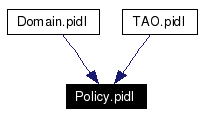
import "UShortSeq.pidl";
import "Current.pidl";
import "Policy_Forward.pidl";
Include dependency graph for Policy.pidl:

This graph shows which files directly or indirectly include this file:

Namespaces | |
| namespace | CORBA |
Classes | |
| exception | CORBA::PolicyError |
| exception | CORBA::InvalidPolicies |
| interface | CORBA::Policy |
| interface | CORBA::PolicyManager |
| interface | CORBA::PolicyCurrent |
Typedefs | |
| typedef short | PolicyErrorCode |
Variables | |
| const PolicyErrorCode | BAD_POLICY = 0 |
| const PolicyErrorCode | UNSUPPORTED_POLICY = 1 |
| const PolicyErrorCode | BAD_POLICY_TYPE = 2 |
| const PolicyErrorCode | BAD_POLICY_VALUE = 3 |
| const PolicyErrorCode | UNSUPPORTED_POLICY_VALUE = 4 |
This file is used to generate the code in PolicyC.{h,i,cpp}. Also, skeleton code for the only non local Policy interface is generated from this pidl file and then the declaration code is moved to tao/PortableServer/PolicyS.{h,i,cpp}
The steps to regenerate the code are as follows:
1. Run the tao_idl compiler on the patched pidl file. The command used for this is:
tao_idl.exe -o orig -Gp -Gd -Ge 1 -GT -GA -Wb,export_macro=TAO_Export -Wb,export_include="tao/TAO_Export.h" -Wb,pre_include="ace/pre.h" -Wb,post_include="ace/post.h" Policy.pidl
2. Then patch the generated code using patches in diff/Policy.diff. To patch the generated code in PortableServer look for diffs in PortableServer/diffs directory.
Note: The diffs were generated with these commands:
for i in PolicyC.{h,i,cpp}; do diff -wBbu orig/$i $i; done > diffs/Policy.diff for i in Policy{S,S_T}.{h,i,cpp}; do diff -wBbu orig/$i PortableServer/$i; done >> diffs/Policy.diff
|
|
|
|
|
|
|
|
|
|
|
|
|
|
|
|
|
|
 1.3.9.1
1.3.9.1